 Folate is one of the B vitamins. Our bodies use folate to make new cells. Folate is especially important for women of childbearing age, pregnant and nursing women, growing children, and older people. If you don’t get enough folate in your diet, you could get anemia. You also could be at higher risk for heart disease, stroke, cancer, or memory problems. This 1-page large print fact sheet was written by Linda B. Bobroff, and published by the UF Department of Family Youth and Community Sciences, September 2012.
Folate is one of the B vitamins. Our bodies use folate to make new cells. Folate is especially important for women of childbearing age, pregnant and nursing women, growing children, and older people. If you don’t get enough folate in your diet, you could get anemia. You also could be at higher risk for heart disease, stroke, cancer, or memory problems. This 1-page large print fact sheet was written by Linda B. Bobroff, and published by the UF Department of Family Youth and Community Sciences, September 2012.
http://edis.ifas.ufl.edu/fy055
Category: Health & Nutrition
MyPyramid for Kids (FAR8047/FM356)
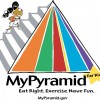 “In 2005, MyPyramid for Kids was launched with the positive slogan ‘Eat Right. Exercise. Have Fun.’ This new resource, targeting children ages six to eleven, is an excellent tool to help children improve their food and activity choices.” This 2-page Family Album Radio transcript was written by Ariadna M. Rodriguez and Linda Bobroff, and published by the UF Department of Family Youth and Community Sciences, August 2012.
“In 2005, MyPyramid for Kids was launched with the positive slogan ‘Eat Right. Exercise. Have Fun.’ This new resource, targeting children ages six to eleven, is an excellent tool to help children improve their food and activity choices.” This 2-page Family Album Radio transcript was written by Ariadna M. Rodriguez and Linda Bobroff, and published by the UF Department of Family Youth and Community Sciences, August 2012.
http://edis.ifas.ufl.edu/fm356
The Effects of Caffeine on Lactation (FAR0423/FM354)
 “Human milk is the preferred food for infants, with exceptional physiological benefits not only for the baby but for the mother as well. Mothers need to be aware, though, that many substances that they consume are excreted in breast milk and can profoundly affect the composition and adequacy of her breastmilk. Even caffeine, which many of us consume on a daily basis in our coffee, tea, cola drinks and chocolate, finds its way into breast milk.” This 2-page Family Album Radio transcript was written by Ashley Orynich and Linda Bobroff, and published by the UF Department of Family Youth and Community Sciences, August 2012.
“Human milk is the preferred food for infants, with exceptional physiological benefits not only for the baby but for the mother as well. Mothers need to be aware, though, that many substances that they consume are excreted in breast milk and can profoundly affect the composition and adequacy of her breastmilk. Even caffeine, which many of us consume on a daily basis in our coffee, tea, cola drinks and chocolate, finds its way into breast milk.” This 2-page Family Album Radio transcript was written by Ashley Orynich and Linda Bobroff, and published by the UF Department of Family Youth and Community Sciences, August 2012.
http://edis.ifas.ufl.edu/fm354
Registration and Licensure of Nutrition Professionals in Florida (FCS8765/FY690)
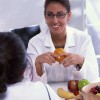 Registration and licensure of nutrition professionals exist to protect the public from people who are not qualified to practice as nutrition professionals, just as licensure of physicians protects the public from people who are not qualified to practice medicine. This 3-page fact sheet provides information about dietetic registration (a national credential) and licensure (a state-specific license). Florida has three credentials that allow people to legally practice as a nutrition or dietetics professional: Registered Dietitian (RD), Licensed Dietitian/Nutritionist (LD/N), and Licensed Nutrition Counselor (LNC). Written by Linda B. Bobroff, and published by the UF Department of Family Youth and Community Sciences, September 2012.
Registration and licensure of nutrition professionals exist to protect the public from people who are not qualified to practice as nutrition professionals, just as licensure of physicians protects the public from people who are not qualified to practice medicine. This 3-page fact sheet provides information about dietetic registration (a national credential) and licensure (a state-specific license). Florida has three credentials that allow people to legally practice as a nutrition or dietetics professional: Registered Dietitian (RD), Licensed Dietitian/Nutritionist (LD/N), and Licensed Nutrition Counselor (LNC). Written by Linda B. Bobroff, and published by the UF Department of Family Youth and Community Sciences, September 2012.
http://edis.ifas.ufl.edu/fy690
El Virus del Nilo Occidental (ENY6425/IN185)
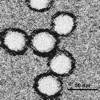 El virus del Nilo Occidental es acarreado por mosquitos y si es transmitido a humanos puede causar una encefalitis severa. Esta relacionado estrechamente con el virus de la encefalitis de St. Louis que a veces es un problema en Florida. El virus del Nilo Occidental fué documentado por primera vez en los Estados Unidos en la ciudad de New York durante una epidemia en 1999. This 4-page fact sheet was written by Jorge Rey, C. Roxanne Connelly, Jonathan F. Day, y Walter J. Tabachnick, and published by the UF Department of Entomology and Nematology, June 2012.
El virus del Nilo Occidental es acarreado por mosquitos y si es transmitido a humanos puede causar una encefalitis severa. Esta relacionado estrechamente con el virus de la encefalitis de St. Louis que a veces es un problema en Florida. El virus del Nilo Occidental fué documentado por primera vez en los Estados Unidos en la ciudad de New York durante una epidemia en 1999. This 4-page fact sheet was written by Jorge Rey, C. Roxanne Connelly, Jonathan F. Day, y Walter J. Tabachnick, and published by the UF Department of Entomology and Nematology, June 2012.
http://edis.ifas.ufl.edu/in185
Nutrition for Health and Fitness: Fiber in Your Diet (FCS8130/HE697)
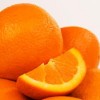 Fiber has many names, such as dietary fiber, total fiber, or just plain fiber. Eating foods that contain fiber is good for your health. This 6-page fact sheet provides tips on how to include foods with fiber in your diet. Written by Linda B. Bobroff, and published by the UF Department of Family Youth and Community Sciences, September 2012.
Fiber has many names, such as dietary fiber, total fiber, or just plain fiber. Eating foods that contain fiber is good for your health. This 6-page fact sheet provides tips on how to include foods with fiber in your diet. Written by Linda B. Bobroff, and published by the UF Department of Family Youth and Community Sciences, September 2012.
http://edis.ifas.ufl.edu/he697
Warning Signs of Anorexia (FAR8055/FM373)
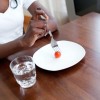 “With concerns about childhood obesity on the rise, the plight of young people with eating disorders such as anorexia nervosa may not be on many people’s minds. However, according to the American Academy of Child and Adolescent Psychiatry, between 5 and 10 million people, including 1% of American teens, have an eating disorder. Anorexia nervosa, an eating disorder characterized by excessive weight loss and severely distorted body image, is one of the most common psychiatric diagnoses in young women.” This 2-page Family Album Radio transcript was written by Jacqueline Endaya and Linda Bobroff, and published by the UF Department of Family Youth and Community Sciences, August 2012.
“With concerns about childhood obesity on the rise, the plight of young people with eating disorders such as anorexia nervosa may not be on many people’s minds. However, according to the American Academy of Child and Adolescent Psychiatry, between 5 and 10 million people, including 1% of American teens, have an eating disorder. Anorexia nervosa, an eating disorder characterized by excessive weight loss and severely distorted body image, is one of the most common psychiatric diagnoses in young women.” This 2-page Family Album Radio transcript was written by Jacqueline Endaya and Linda Bobroff, and published by the UF Department of Family Youth and Community Sciences, August 2012.
http://edis.ifas.ufl.edu/fm373
Newborn Mortality in the United States (FAR0427/FM403)
 “While the United States boasts some of the finest healthcare facilities and services known to humankind, the country also has one of the highest newborn mortality rates in the industrialized world. In fact, according to the World Health Organization, the U.S. is tied for second to last (with Hungary, Malta, Poland and Slovakia), with 5 newborn deaths per 1,000 live births (World Health Organization 2005).” This 2-page Family Album Radio transcript was written by Donna Davis and published by the UF Department of Family Youth and Community Sciences, August 2012.
“While the United States boasts some of the finest healthcare facilities and services known to humankind, the country also has one of the highest newborn mortality rates in the industrialized world. In fact, according to the World Health Organization, the U.S. is tied for second to last (with Hungary, Malta, Poland and Slovakia), with 5 newborn deaths per 1,000 live births (World Health Organization 2005).” This 2-page Family Album Radio transcript was written by Donna Davis and published by the UF Department of Family Youth and Community Sciences, August 2012.
http://edis.ifas.ufl.edu/fm403
Overworked Families (FAR5051/FM407)
 “Most weeks, as I breathlessly try to keep up with my family responsibilities and the demands of my job, I often lament, ‘There just aren’t enough hours in the day!'” This 2-page Family Album Radio transcript was written by Suzanna Smith, and published by the UF Department of Family Youth and Community Sciences, August 2012.
“Most weeks, as I breathlessly try to keep up with my family responsibilities and the demands of my job, I often lament, ‘There just aren’t enough hours in the day!'” This 2-page Family Album Radio transcript was written by Suzanna Smith, and published by the UF Department of Family Youth and Community Sciences, August 2012.
http://edis.ifas.ufl.edu/fm407
Appropriate Weight Gain During Pregnancy (FAR8060/FM392)
 “Many people these days are concerned about weight gain. Pregnant women often share these concerns; however, it's important for pregnant women to understand that weight gain during pregnancy is critical to their babies' health.” This 2-page Family Album Radio transcript was written by Stephanie Allen and Linda Bobroff, and published by the UF Department of Family Youth and Community Sciences, August 2012.
“Many people these days are concerned about weight gain. Pregnant women often share these concerns; however, it's important for pregnant women to understand that weight gain during pregnancy is critical to their babies' health.” This 2-page Family Album Radio transcript was written by Stephanie Allen and Linda Bobroff, and published by the UF Department of Family Youth and Community Sciences, August 2012.
http://edis.ifas.ufl.edu/fm392
Television and Babies' Sleep (FAR0426/FM395)
 “There are a number of video and television programs that have been made for children under the age of three. At times it may be fun to watch your baby or toddler bounce or dance along with the characters on the screen. Many busy caregivers also use these shows to give themselves a little time for a needed break or to prepare a meal or tidy up. However, watching television may not be best for your baby or toddler’s sleep.” This 2-page Family Album Radio transcript was written by Kristen McDanel and Suzanna Smith, and published by the UF Department of Family Youth and Community Sciences, August 2012.
“There are a number of video and television programs that have been made for children under the age of three. At times it may be fun to watch your baby or toddler bounce or dance along with the characters on the screen. Many busy caregivers also use these shows to give themselves a little time for a needed break or to prepare a meal or tidy up. However, watching television may not be best for your baby or toddler’s sleep.” This 2-page Family Album Radio transcript was written by Kristen McDanel and Suzanna Smith, and published by the UF Department of Family Youth and Community Sciences, August 2012.
http://edis.ifas.ufl.edu/fm395
Contact Organization for Caregivers (FCS2258/FY870)
 As an older adult or caregiver for an older adult, you may need to contact multiple agencies and offices if you are seeking medical care. It helps to be organized when you contact these agencies so you know what questions to ask and have somewhere to write down the answers. This worksheet provides a contact form that will help you keep track of your conversations. This 3-page fact sheet was written by Martie Gillen and Carolyn S. Wilken, and published by the UF Department of Family Youth and Community Sciences, August 2012. http://edis.ifas.ufl.edu/fy870
As an older adult or caregiver for an older adult, you may need to contact multiple agencies and offices if you are seeking medical care. It helps to be organized when you contact these agencies so you know what questions to ask and have somewhere to write down the answers. This worksheet provides a contact form that will help you keep track of your conversations. This 3-page fact sheet was written by Martie Gillen and Carolyn S. Wilken, and published by the UF Department of Family Youth and Community Sciences, August 2012. http://edis.ifas.ufl.edu/fy870
Teen Birth Rates Decline (FAR1208/FM420)
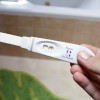 “Parents and others who are concerned about teenagers having babies have reason to celebrate. According to the nonprofit research organization Child Trends, the teenage birth rate for 15-19 year olds is at the lowest point in over 40 years. This drop began in 1991 and has roceeded steadily so that it is now one-third lower than the 1991 peak. The other good news is that it continues to fall.” This 2-page Family Album Radio transcript was written by Suzanna Smith, and published by the UF Department of Family Youth and Community Sciences, July 2012.
“Parents and others who are concerned about teenagers having babies have reason to celebrate. According to the nonprofit research organization Child Trends, the teenage birth rate for 15-19 year olds is at the lowest point in over 40 years. This drop began in 1991 and has roceeded steadily so that it is now one-third lower than the 1991 peak. The other good news is that it continues to fall.” This 2-page Family Album Radio transcript was written by Suzanna Smith, and published by the UF Department of Family Youth and Community Sciences, July 2012.
http://edis.ifas.ufl.edu/fm420
Doctor Appointment Checklist (FCS2236/FY746)
 When you have a doctor appointment, you should make the most of your time with the doctor. This worksheet will help you remember what questions you want to ask and give you a space to take notes. This document is also beneficial if you are a caregiver for an older adult and go along to appointments. This 5-page fact sheet was written by Martie Gillen and Carolyn S. Wilken, and published by the UF Department of Family, Youth, and Community Sciences, August 2012. http://edis.ifas.ufl.edu/fy746
When you have a doctor appointment, you should make the most of your time with the doctor. This worksheet will help you remember what questions you want to ask and give you a space to take notes. This document is also beneficial if you are a caregiver for an older adult and go along to appointments. This 5-page fact sheet was written by Martie Gillen and Carolyn S. Wilken, and published by the UF Department of Family, Youth, and Community Sciences, August 2012. http://edis.ifas.ufl.edu/fy746
Questions to Ask Before Agreeing to Surgery (FCS2235/FY745)
 Before you agree to have surgery, you need to be aware of the risks and benefits. The best way to do this is to discuss the surgery with your doctor. Use this worksheet to ask questions and take notes so that you have all the information you need. This 3-page fact sheet was written by Martie Gillen and Carolyn S. Wilken, and published by the UF Department of Family, Youth, and Community Sciences, August 2012. http://edis.ifas.ufl.edu/fy745
Before you agree to have surgery, you need to be aware of the risks and benefits. The best way to do this is to discuss the surgery with your doctor. Use this worksheet to ask questions and take notes so that you have all the information you need. This 3-page fact sheet was written by Martie Gillen and Carolyn S. Wilken, and published by the UF Department of Family, Youth, and Community Sciences, August 2012. http://edis.ifas.ufl.edu/fy745
Living with Diabetes (FCS8706/FY334)
 Diabetes is a disease that affects more than 26 million Americans. Although there is no cure for type 1 or type 2 diabetes, diabetes can be managed with the proper care. If you have diabetes, the best way to live well is to learn about the disease and work with your doctor to develop a healthy living plan that is right for you. This 4-page fact sheet was written by Nancy J. Gal and Linda B. Bobroff, and published by the UF Department of Family Youth and Community Sciences, July 2012.
Diabetes is a disease that affects more than 26 million Americans. Although there is no cure for type 1 or type 2 diabetes, diabetes can be managed with the proper care. If you have diabetes, the best way to live well is to learn about the disease and work with your doctor to develop a healthy living plan that is right for you. This 4-page fact sheet was written by Nancy J. Gal and Linda B. Bobroff, and published by the UF Department of Family Youth and Community Sciences, July 2012.
http://edis.ifas.ufl.edu/fy334
Preparing Healthful Ethnic Foods (FCS8757/FY343)
 Eating a variety of nutrient-rich foods helps you get the nutrients you need to look and feel your best. One tasty way to increase variety in your food choices is to include ethnic foods like Chinese, Mexican, Italian, Greek, and others. How do you know that you are making healthy choices when you eat these foods? This 3-page fact sheet was written by Linda B. Bobroff and R. Elaine Turner, and published by the UF Department of Family Youth and Community Sciences, June 2012.
Eating a variety of nutrient-rich foods helps you get the nutrients you need to look and feel your best. One tasty way to increase variety in your food choices is to include ethnic foods like Chinese, Mexican, Italian, Greek, and others. How do you know that you are making healthy choices when you eat these foods? This 3-page fact sheet was written by Linda B. Bobroff and R. Elaine Turner, and published by the UF Department of Family Youth and Community Sciences, June 2012.
http://edis.ifas.ufl.edu/fy343
De compras para la salud: Dietas Vegetarianas (FSHN1106S/FS194)
 Las dietas vegetarianas bien balanceadas pueden ser nutritivas y ofrecen una variedad de beneficios para la salud. Los vegetarianos son menos propensos a generar enfermedades crónicas como la diabetes, hipertensión, enfermedades coronarias y ciertos tipos de cáncer. Pero los vegetarianos tienen un riesgo mayor de sufrir muchas deficiencias de nutrientes, incluyendo el hierro, la vitamina B12, el calcio y el zinc. This 4-page fact sheet was written by Lauren Foster and Wendy J. Dahl, and published by the UF Department of Food Science and Human Nutrition, June 2012.
Las dietas vegetarianas bien balanceadas pueden ser nutritivas y ofrecen una variedad de beneficios para la salud. Los vegetarianos son menos propensos a generar enfermedades crónicas como la diabetes, hipertensión, enfermedades coronarias y ciertos tipos de cáncer. Pero los vegetarianos tienen un riesgo mayor de sufrir muchas deficiencias de nutrientes, incluyendo el hierro, la vitamina B12, el calcio y el zinc. This 4-page fact sheet was written by Lauren Foster and Wendy J. Dahl, and published by the UF Department of Food Science and Human Nutrition, June 2012.
http://edis.ifas.ufl.edu/fs194
Breastfeeding during Disaster (FAR0430/FM429)
 “As we’ve learned over the past couple of years, disaster can strike anyone, anywhere, and anytime. A natural disaster, whether hurricane, tornado, flood, or tsunami, can devastate areas and leave families without resources, sometimes for long periods of time. And while people of all ages suffer, infants can be at far greater risk. However, mothers can save their infants’ lives and protect them from illness by simply breastfeeding, even if they haven’t been breastfeeding their baby.” This 2-page Family Album Radio transcript was written by Donna Davis, and published by the UF Department of Family Youth and Community Sciences, July 2012.
“As we’ve learned over the past couple of years, disaster can strike anyone, anywhere, and anytime. A natural disaster, whether hurricane, tornado, flood, or tsunami, can devastate areas and leave families without resources, sometimes for long periods of time. And while people of all ages suffer, infants can be at far greater risk. However, mothers can save their infants’ lives and protect them from illness by simply breastfeeding, even if they haven’t been breastfeeding their baby.” This 2-page Family Album Radio transcript was written by Donna Davis, and published by the UF Department of Family Youth and Community Sciences, July 2012.
http://edis.ifas.ufl.edu/fm429
Ehrlichia y Anaplasma en Florida (ENY662S/IN422)
 Ehrlichia y Anaplasma son géneros bacterianos emparentados que causan enfermedades en humanos y en animales domésticos. A las enfermedades se les llama generalmente erliquiosis (ehrlichiosis) o anaplasmosis, pero existen varias especies de bacteria que causan diferentes síntomas y pueden tener diferentes vectores. This 4-page fact sheet was written by Jorge R. Rey, Cynthia C. Lord, y Roxanne Rutledge Connelly, and published by the UF Department of Entomology and Nematology, July 2012.
Ehrlichia y Anaplasma son géneros bacterianos emparentados que causan enfermedades en humanos y en animales domésticos. A las enfermedades se les llama generalmente erliquiosis (ehrlichiosis) o anaplasmosis, pero existen varias especies de bacteria que causan diferentes síntomas y pueden tener diferentes vectores. This 4-page fact sheet was written by Jorge R. Rey, Cynthia C. Lord, y Roxanne Rutledge Connelly, and published by the UF Department of Entomology and Nematology, July 2012.
http://edis.ifas.ufl.edu/in422